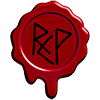a real communion of past and present selves
In Conversation with Krys Malcolm Belc
Billy Lezra & Liam Lezra
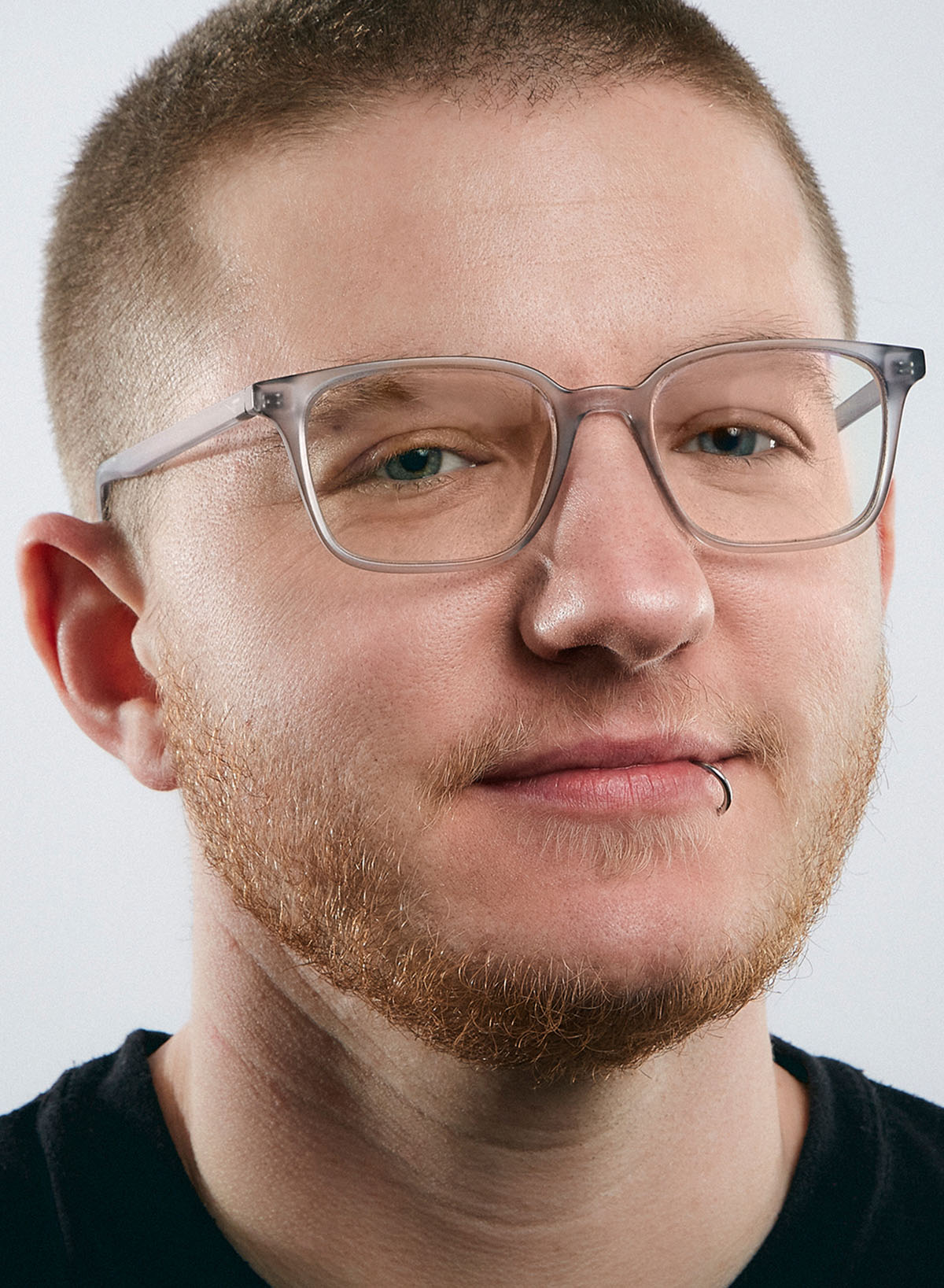
photo by Mark Likosky
Krys Malcolm Belc is the author of the flash nonfiction chapbook In Transit (The Cupboard Pamphlet) and the forthcoming memoir The Natural Mother of the Child (Counterpoint). His work has appeared in Granta, Black Warrior Review, The Rumpus, and elsewhere and has been anthologized in Best of the Net 2018 and Wigleaf Top 50. Krys has won contests at Redivider and Pigeon Pages and his work has been supported by the Sustainable Arts Foundation. He received his BA from Swarthmore College, his M.Ed in Special Education from Arcadia University, and his MFA in Creative Writing at Northern Michigan University. Krys lives in Philadelphia with his partner and their three young children.
How and when did you start writing?
As a kid, I wrote stories that were basically auto-fiction. I would keep them on a floppy disk that I hid in my room. But I didn’t start writing seriously until many years after undergrad. I taught in Philadelphia for seven years before I applied to MFA programs. I hadn’t written anything since I was an undergrad. I wrote a story for the purpose of the application.
How did you decide to apply to an MFA program?
I went to a wedding when my partner was pregnant with our third kid. While we were there, we went to a bookstore and met up with a friend, who is a novelist. She was talking about working on her second novel and her writer’s life. She had been a high school teacher in Philadelphia at the same time I was. We would have dinner together and talk about how much lesson planning sucked and all the papers we had to grade. And then she just quit and went and got an MFA. I felt like I missed a boat that I should have taken. So I was literally in this bookstore and thought, yeah, I’m going to do this too. It was October. Applications were due in December and January. My partner gave birth in November. I was taking a few weeks off. So I used those weeks to help with the new baby and the other kids, write the story, and get in.
You said in an interview that you felt controlled by fiction as a medium, but less so with memoir.
I get very easily sidetracked by research when I’m writing fiction. I get narrowly focused and detail-oriented. In nonfiction, I can’t recreate my own memories to be different. I can’t research my way into new life experiences. When I write nonfiction and read the research, it actually takes my mind to an interesting place.
How have your children influenced your writing?
I don’t try to portray them on the page as they are. That’s not interesting to me, and I don’t think it is my role in their lives. I don’t want them to have biographies that are written by someone else without their informed consent. I think it would be weird. So I write a lot about them, but it’s about how family life influences my own thinking and outlook on the world. The kids are the family. I feel like my partner is more fair game for real writing and the kids are more like cardboard cutouts of people that I write about.
How do you decide which details to leave on the page and what should be left off the page?
A lot of the details I write about with my kids in particular are generic things. They always want to eat. They’re always making a mess. They go through a lot of diapers. They’re expensive. They make me tired. They wake up at inconvenient times. It’s nothing deeply personal or attributable to them as individual people. It’s different with my parents. I didn’t ask to be here and my parents made me, so they’re fair game because they shouldn’t have had kids if they didn’t want to have their parenting scrutinized. I think they’re probably pretty chill about it, honestly, because I’m not the only artist out of my siblings.
How do you decide what to write about your partner?
She says her coworkers have read the book because it’s about family life and things they’re interested in. They keep asking her, “how do you feel about having so much personal stuff in a book?” She asks them which stuff they find personal, and everyone says something different. I like the idea that what is personal is so different to different people. She says there’s no way to have someone write about you and have it not be personal.
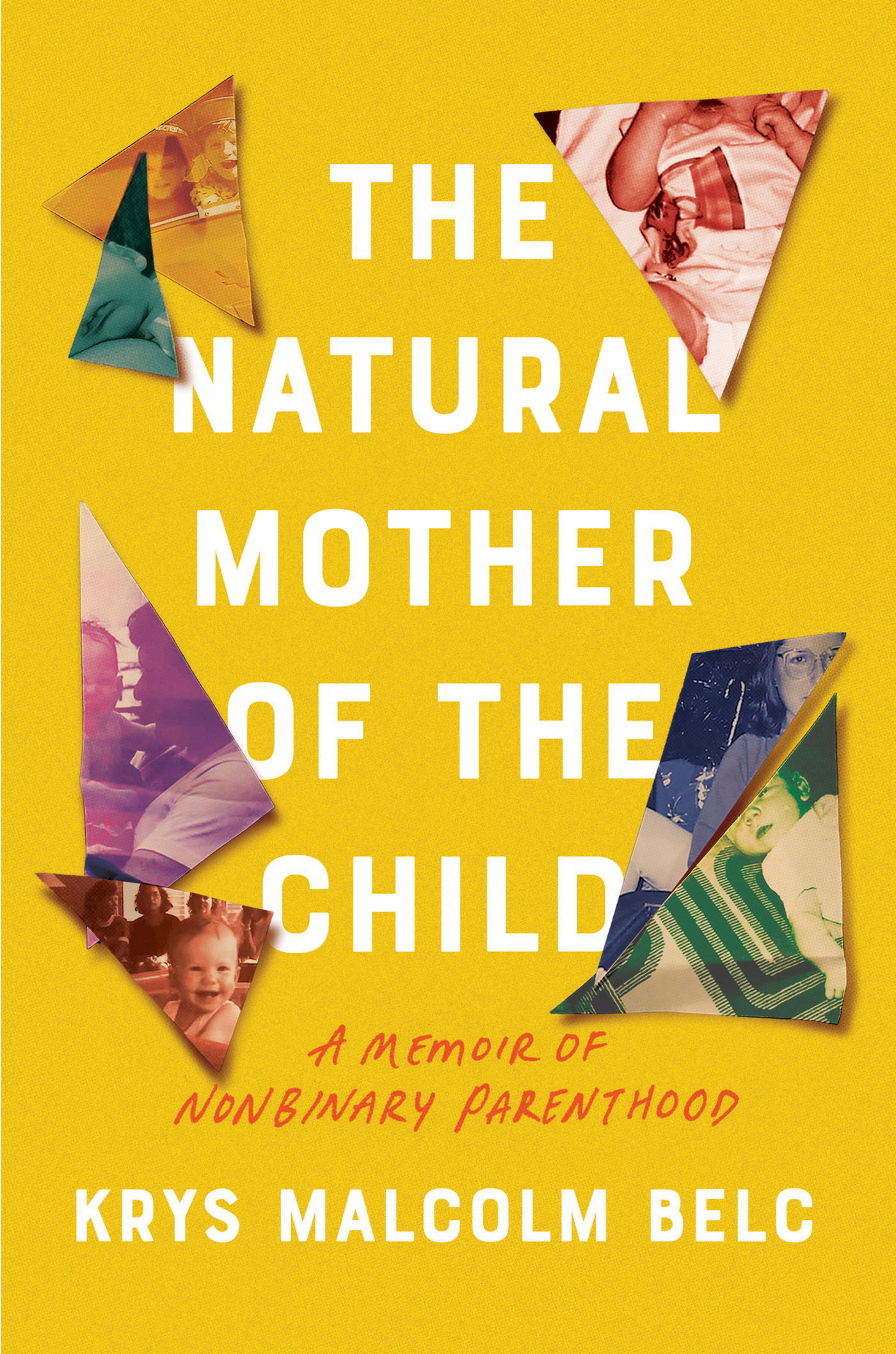
You wrote an essay in which you said you had ambivalent feelings about writing about your childhood. Would you say more about that?
My feelings about this have changed. Writing this book inspired me to use photos of my childhood, which was a real communion of past and present selves for me. Reclaiming those images as something that truly belonged to and within my own narrative was very powerful for me on a personal level. That’s why the photographs are in the book. It’s not to illustrate things or because I was cute as a baby. It’s to take hold of things that represent a story that’s been told about me, or things that feel like they happened to me, and share my interpretation, rather than what my parents or anyone else would say. I didn’t want to be a cardboard cutout my parents imagined. When you tell a story about your own kids, it’s a story about how you remember things. I want to be an active participant in storytelling. I have hopes that my kids will also do that one day.
You recently tweeted, “Stop wringing your hands about [Hormone Replacement Therapy]. life and aging are irreversible changes. the things that happen to our bodies from stress, playing sports, accidents, pregnancy, pollution, taking medications, getting sick…this is all really just about controlling trans ppl. just say that.” When and how did you come to that?
When I started taking T, I was not certain it was something I wanted to do. I had been thinking about it for a decade. If I had to wait until I was sure I wanted every aspect of the experience, I would have never taken T. Eventually, I thought: “So what a few things might start to change about my body? It’s not like I love it to begin with.” I’m allowed to make a decision that I might not entirely like. That’s what people do all the time. It’s fine to do things you’re not one hundred percent sure about. I also had a baby. I wasn’t one hundred percent sure it was going to be great and that I was going to love it all. That is ridiculous. Nobody thinks that. I think some people like being pregnant more than other people. The degree to which they’re glad that they did it varies. There’s no reason why trans people should be held to a different standard than cis people, or that we should have to read ten thousand medical journals about every single thing that could possibly happen. We do not hold other people to that standard when they do body modification of any kind.
Pregnancy is a form of transition, to a different kind of body. People who have given birth and people who haven’t are different in their bodies. People come in for their second labor and give birth in half an hour when it took them thirty hours the first time. Their body is primed to have a baby because they’ve done something that forever altered their body. I’m very happy for them if that’s what they wanted to do. And I think that I should be allowed to do things, also. I’m scared of surgery. Surgery is scary. And people die during surgery, even a surgery that’s been done many times. Does that mean I shouldn’t be allowed to have top surgery? Absolutely not. I should be allowed to have it. But it’s also scary and I might die, so I won’t feel entirely positive about it. And it might have side effects that most people don’t get, but some people do. I’m signing up for that. Anyone can become extremely disabled at any time. And for some reason, we’re wringing our hands over people voluntarily engaging in pretty minor health care for themselves. I just think it’s silly.
I also feel like I’m lucky and privileged because I started T in Philadelphia, so I was able to go to an informed consent clinic and say: “No, I haven’t always felt this way. I can’t remember feeling like a boy as a child. I’m not one hundred percent sure that this is going to be great. I haven’t told my parents and I don’t intend to. I didn’t know I was a man since I was three.” I didn’t have to parrot any of that to obtain hormones. So when I moved to the middle of nowhere in upstate Michigan for my MFA, I also conveniently never engaged in that talk because I had already started hormone therapy in Philadelphia, and I had a prescription. I never had to justify it in the way a lot of people do. I’m able to keep this perspective also because I have had such a privileged medical experience.
What brings you joy these days?
There’s a new donut shop near my house… I’ve been thinking about how best to express my appreciation to them for their assistance during the pandemic. I started working at home. I never had a desk job before because I was always a teacher, so I wasn’t used to sitting. It’s been rough. I’m still working at home and my kids are off for the summer, and they never went to full-time school this year. This donut shop was open on the weekends only, for a lot of the pandemic. Every Saturday morning we’d be the first people there at eight. This was a ritual for us, in a time when we really weren’t able to have the structure that we thrive on. I’m a very structured parent and I’ve always been the primary home person, so our kids are used to a very structured life. We haven’t been able to provide that in the same way. So being able to go get these donuts has been amazing. Those donuts really do bring me joy. And everyone who follows me on Instagram knows because a quarter of the pictures I post are from this one donut shop. Philly has great donuts everywhere, but they’re not all here for me, the way that donut shop is here for me. Also, I really like reading novels.
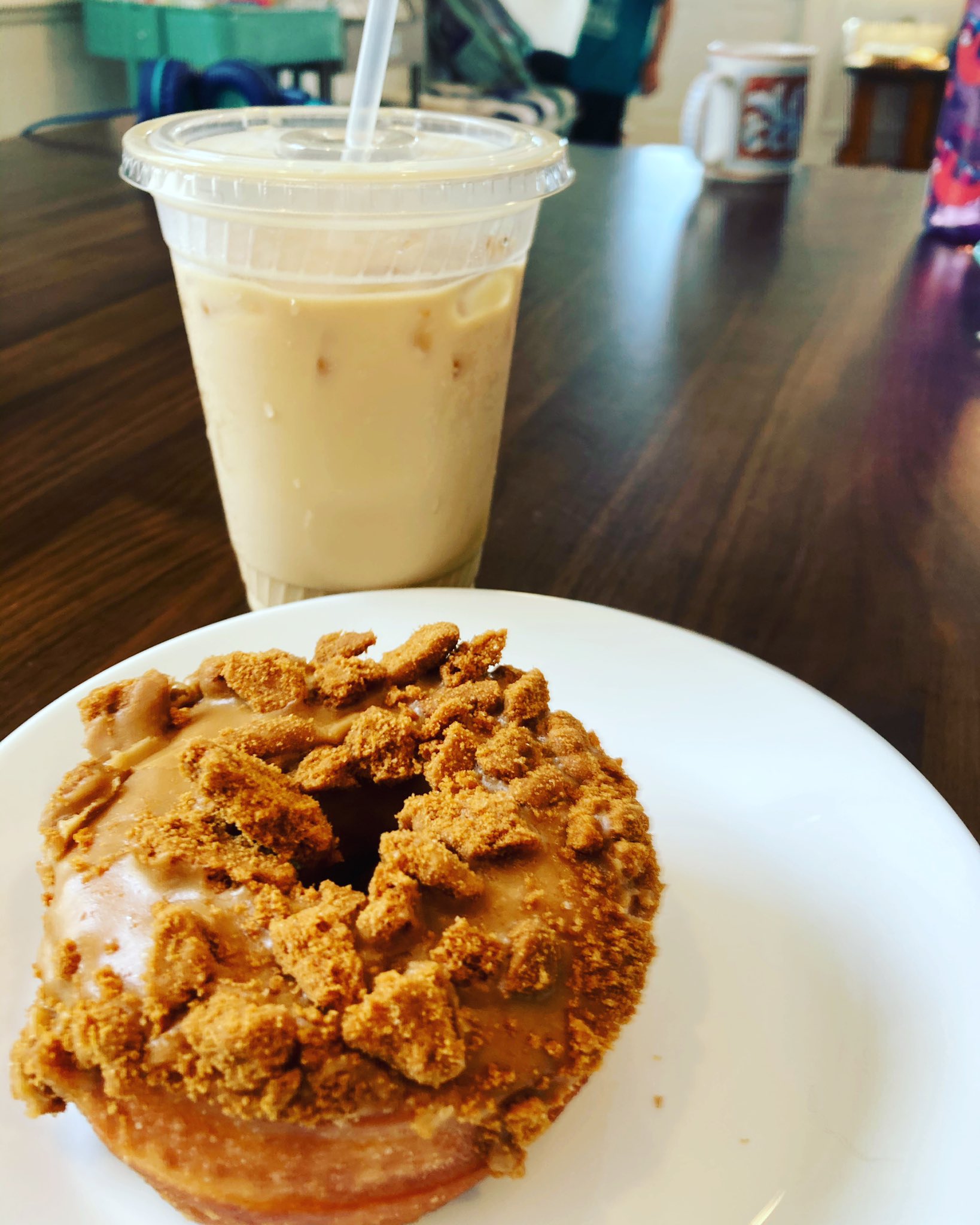
What kind of novels?
My partner and I have been doing a monthly pandemic book club where we’re trying to read books that we don’t know anything about, but feel as if we should. We read Emily Wilson’s translation of The Odyssey and The Fire Next Time by James Baldwin. I’m finishing up My Antonia, which I’ve now been reading for a while. I also recently read Patrick Cottrell’s Sorry to Disrupt the Peace.
What brings you hope?
I’ve been vaccinated for a long time because of my work, so I enjoy being vaccinated. And I think I’m starting to write things that I like. It’s important for me to remind myself that I just started writing nonfiction recently. So I think I can get better at it. That makes me feel hopeful because I would like to write better books. I think my book is a good book, but I want to write more books that are even better, you know?
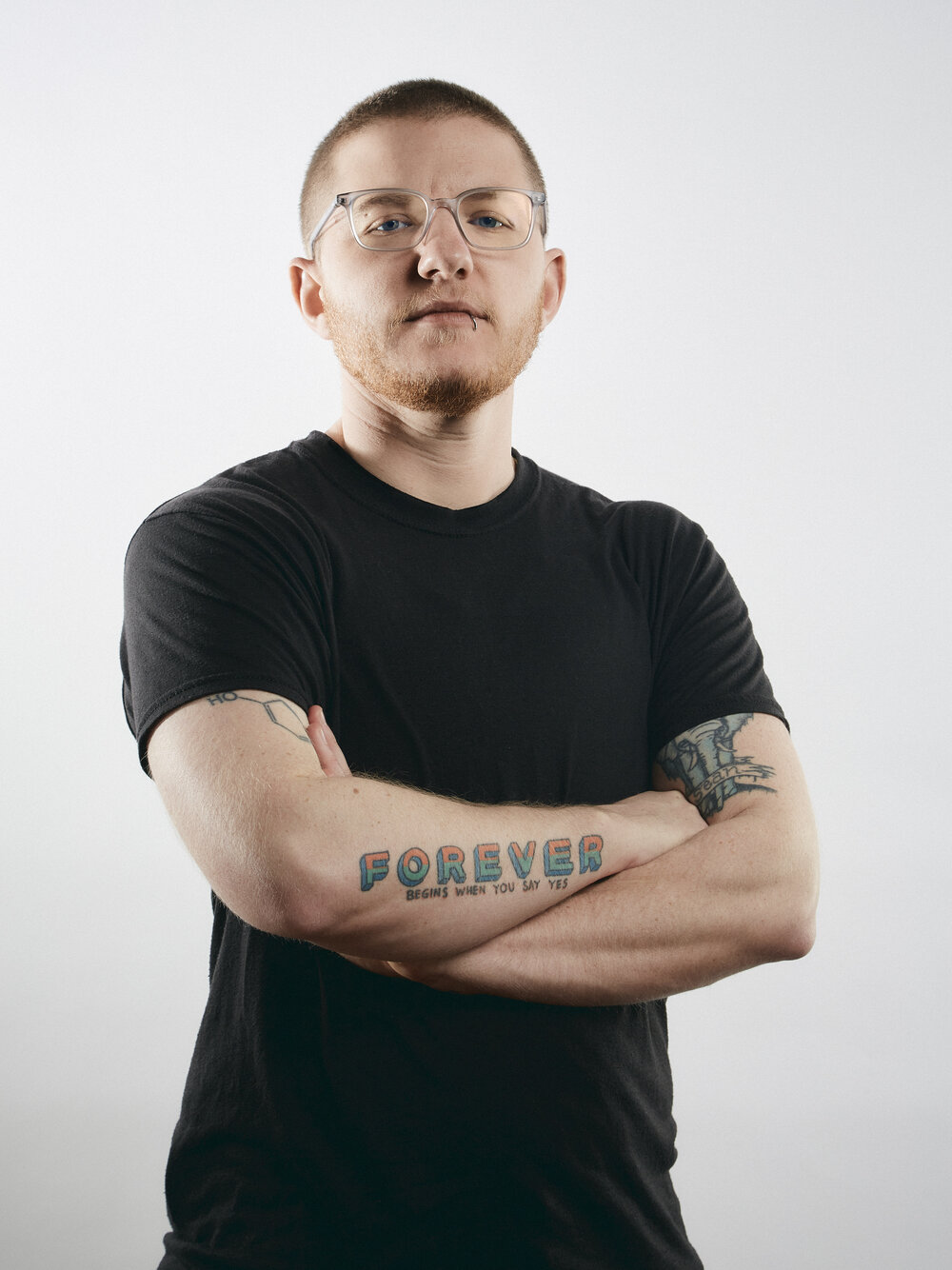
photo by Mark Likosky
a real communion of past and present selves
In Conversation with Krys Malcolm Belc
Billy Lezra & Liam Lezra

photo by Mark Likosky
Krys Malcolm Belc is the author of the flash nonfiction chapbook In Transit (The Cupboard Pamphlet) and the forthcoming memoir The Natural Mother of the Child (Counterpoint). His work has appeared in Granta, Black Warrior Review, The Rumpus, and elsewhere and has been anthologized in Best of the Net 2018 and Wigleaf Top 50. Krys has won contests at Redivider and Pigeon Pages and his work has been supported by the Sustainable Arts Foundation. He received his BA from Swarthmore College, his M.Ed in Special Education from Arcadia University, and his MFA in Creative Writing at Northern Michigan University. Krys lives in Philadelphia with his partner and their three young children.
How and when did you start writing?
As a kid, I wrote stories that were basically auto-fiction. I would keep them on a floppy disk that I hid in my room. But I didn’t start writing seriously until many years after undergrad. I taught in Philadelphia for seven years before I applied to MFA programs. I hadn’t written anything since I was an undergrad. I wrote a story for the purpose of the application.
How did you decide to apply to an MFA program?
I went to a wedding when my partner was pregnant with our third kid. While we were there, we went to a bookstore and met up with a friend, who is a novelist. She was talking about working on her second novel and her writer’s life. She had been a high school teacher in Philadelphia at the same time I was. We would have dinner together and talk about how much lesson planning sucked and all the papers we had to grade. And then she just quit and went and got an MFA. I felt like I missed a boat that I should have taken. So I was literally in this bookstore and thought, yeah, I’m going to do this too. It was October. Applications were due in December and January. My partner gave birth in November. I was taking a few weeks off. So I used those weeks to help with the new baby and the other kids, write the story, and get in.
You said in an interview that you felt controlled by fiction as a medium, but less so with memoir.
I get very easily sidetracked by research when I’m writing fiction. I get narrowly focused and detail-oriented. In nonfiction, I can’t recreate my own memories to be different. I can’t research my way into new life experiences. When I write nonfiction and read the research, it actually takes my mind to an interesting place.
How have your children influenced your writing?
I don’t try to portray them on the page as they are. That’s not interesting to me, and I don’t think it is my role in their lives. I don’t want them to have biographies that are written by someone else without their informed consent. I think it would be weird. So I write a lot about them, but it’s about how family life influences my own thinking and outlook on the world. The kids are the family. I feel like my partner is more fair game for real writing and the kids are more like cardboard cutouts of people that I write about.
How do you decide which details to leave on the page and what should be left off the page?
A lot of the details I write about with my kids in particular are generic things. They always want to eat. They’re always making a mess. They go through a lot of diapers. They’re expensive. They make me tired. They wake up at inconvenient times. It’s nothing deeply personal or attributable to them as individual people. It’s different with my parents. I didn’t ask to be here and my parents made me, so they’re fair game because they shouldn’t have had kids if they didn’t want to have their parenting scrutinized. I think they’re probably pretty chill about it, honestly, because I’m not the only artist out of my siblings.
How do you decide what to write about your partner?
She says her coworkers have read the book because it’s about family life and things they’re interested in. They keep asking her, “how do you feel about having so much personal stuff in a book?” She asks them which stuff they find personal, and everyone says something different. I like the idea that what is personal is so different to different people. She says there’s no way to have someone write about you and have it not be personal.

You wrote an essay in which you said you had ambivalent feelings about writing about your childhood. Would you say more about that?
My feelings about this have changed. Writing this book inspired me to use photos of my childhood, which was a real communion of past and present selves for me. Reclaiming those images as something that truly belonged to and within my own narrative was very powerful for me on a personal level. That’s why the photographs are in the book. It’s not to illustrate things or because I was cute as a baby. It’s to take hold of things that represent a story that’s been told about me, or things that feel like they happened to me, and share my interpretation, rather than what my parents or anyone else would say. I didn’t want to be a cardboard cutout my parents imagined. When you tell a story about your own kids, it’s a story about how you remember things. I want to be an active participant in storytelling. I have hopes that my kids will also do that one day.
You recently tweeted, “Stop wringing your hands about [Hormone Replacement Therapy]. life and aging are irreversible changes. the things that happen to our bodies from stress, playing sports, accidents, pregnancy, pollution, taking medications, getting sick…this is all really just about controlling trans ppl. just say that.” When and how did you come to that?
When I started taking T, I was not certain it was something I wanted to do. I had been thinking about it for a decade. If I had to wait until I was sure I wanted every aspect of the experience, I would have never taken T. Eventually, I thought: “So what a few things might start to change about my body? It’s not like I love it to begin with.” I’m allowed to make a decision that I might not entirely like. That’s what people do all the time. It’s fine to do things you’re not one hundred percent sure about. I also had a baby. I wasn’t one hundred percent sure it was going to be great and that I was going to love it all. That is ridiculous. Nobody thinks that. I think some people like being pregnant more than other people. The degree to which they’re glad that they did it varies. There’s no reason why trans people should be held to a different standard than cis people, or that we should have to read ten thousand medical journals about every single thing that could possibly happen. We do not hold other people to that standard when they do body modification of any kind.
Pregnancy is a form of transition, to a different kind of body. People who have given birth and people who haven’t are different in their bodies. People come in for their second labor and give birth in half an hour when it took them thirty hours the first time. Their body is primed to have a baby because they’ve done something that forever altered their body. I’m very happy for them if that’s what they wanted to do. And I think that I should be allowed to do things, also. I’m scared of surgery. Surgery is scary. And people die during surgery, even a surgery that’s been done many times. Does that mean I shouldn’t be allowed to have top surgery? Absolutely not. I should be allowed to have it. But it’s also scary and I might die, so I won’t feel entirely positive about it. And it might have side effects that most people don’t get, but some people do. I’m signing up for that. Anyone can become extremely disabled at any time. And for some reason, we’re wringing our hands over people voluntarily engaging in pretty minor health care for themselves. I just think it’s silly.
I also feel like I’m lucky and privileged because I started T in Philadelphia, so I was able to go to an informed consent clinic and say: “No, I haven’t always felt this way. I can’t remember feeling like a boy as a child. I’m not one hundred percent sure that this is going to be great. I haven’t told my parents and I don’t intend to. I didn’t know I was a man since I was three.” I didn’t have to parrot any of that to obtain hormones. So when I moved to the middle of nowhere in upstate Michigan for my MFA, I also conveniently never engaged in that talk because I had already started hormone therapy in Philadelphia, and I had a prescription. I never had to justify it in the way a lot of people do. I’m able to keep this perspective also because I have had such a privileged medical experience.
What brings you joy these days?
There’s a new donut shop near my house… I’ve been thinking about how best to express my appreciation to them for their assistance during the pandemic. I started working at home. I never had a desk job before because I was always a teacher, so I wasn’t used to sitting. It’s been rough. I’m still working at home and my kids are off for the summer, and they never went to full-time school this year. This donut shop was open on the weekends only, for a lot of the pandemic. Every Saturday morning we’d be the first people there at eight. This was a ritual for us, in a time when we really weren’t able to have the structure that we thrive on. I’m a very structured parent and I’ve always been the primary home person, so our kids are used to a very structured life. We haven’t been able to provide that in the same way. So being able to go get these donuts has been amazing. Those donuts really do bring me joy. And everyone who follows me on Instagram knows because a quarter of the pictures I post are from this one donut shop. Philly has great donuts everywhere, but they’re not all here for me, the way that donut shop is here for me. Also, I really like reading novels.

What kind of novels?
My partner and I have been doing a monthly pandemic book club where we’re trying to read books that we don’t know anything about, but feel as if we should. We read Emily Wilson’s translation of The Odyssey and The Fire Next Time by James Baldwin. I’m finishing up My Antonia, which I’ve now been reading for a while. I also recently read Patrick Cottrell’s Sorry to Disrupt the Peace.
What brings you hope?
I’ve been vaccinated for a long time because of my work, so I enjoy being vaccinated. And I think I’m starting to write things that I like. It’s important for me to remind myself that I just started writing nonfiction recently. So I think I can get better at it. That makes me feel hopeful because I would like to write better books. I think my book is a good book, but I want to write more books that are even better, you know?

photo by Mark Likosky

